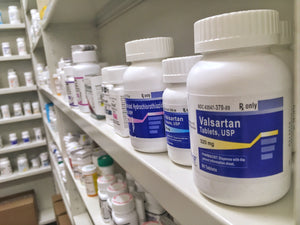Hypertension is one of the most common cardiovascular conditions in the United States, with around 45% of adults in the US suffering from it, according to the Centers for Disease Control and Prevention (CDC).
What is Hypertension?
Hypertension means high blood pressure. Your blood pressure naturally changes throughout the day, rising and falling depending on your activities. With hypertension, it is higher than usual consistently.
The higher your blood pressures are, the higher the risk for more severe conditions like heart attack, heart disease and stroke.
What are Angiotensin Receptor Blockers (ARBs)?
Angiotensin receptor blockers (ARBs), known for their blood pressure-lowering effects, are crucial in managing hypertension and heart failure. These potent drugs have been exhaustively studied over the years, demonstrating a significant reduction in the risk of stroke and heart disease. The very high number of adults in the United States suffering from hypertension makes the use of ARBs pervasive.
So, what are angiotensin receptor blockers? ARBs reduce the action of the hormone angiotensin II. This hormone has a powerful constricting effect on blood vessels, increasing blood pressure. Another effect Angiotensin II has on your body is that it stimulates salt and water retention, further increasing blood pressure.
ARBs work in the heart, blood vessels and kidneys by blocking receptors that this hormone acts on, which helps to lower blood pressure and prevent damage to the heart and kidneys.
The most common pharmaceutical brands and names of ARBs include Losartan (Cozaar), Valsartan (Diovan), Olmesartan (Benicar), Candesartan (Atacand), and Telmisartan (Micardis). Each drug has a unique potency and side effect profile, and the choice of ARB is typically tailored to the patient's specific needs and overall health condition.
Side Effects of Angiotensin Receptor Blockers
Nonetheless, like other medications, the long-term use of ARBs may lead to certain nutrient deficiencies. This article explores these deficiencies, their implications, and how to manage them effectively.
While ARBs are generally safe and effective, they can affect specific nutrients, primarily potassium and magnesium. It's important to note that not every individual on ARB therapy will develop these deficiencies, but it's essential to be aware of the potential risks.
Potassium Deficiency
ARBs block the action of a hormone called angiotensin II, which helps regulate blood pressure. While doing so, they can cause potassium levels to rise. In fact, hyperkalemia (excess potassium) is a well-documented side effect of ARBs. A study published in the Journal of Clinical Hypertension (2018) found an increased risk of hyperkalemia in patients on ARBs, especially those with kidney disease or diabetes.
Solution: Regular monitoring of potassium levels is recommended for patients on ARBs. Depending on the potassium levels, dietary modification or a dose adjustment may be necessary, as well as potassium supplementation.
Magnesium Deficiency
There is some evidence to suggest that ARBs might influence magnesium levels. A study in the American Journal of Hypertension (2016) showed increased serum magnesium levels in patients treated with ARBs. However, the clinical implications of this increase are not yet fully understood.
Solution: Regular monitoring of serum magnesium levels might be beneficial, especially for those patients on long-term ARB therapy and magnesium supplementation as needed.
Importance of Testing and Supplementation
As not everybody on an ARB regimen will experience these deficiencies, it is essential to do regular tests for potential deficiencies, as not all symptoms are indicative. Many supplements counter these deficiencies and allow patients to lead a balanced life.
Conclusion
In conclusion, ARBs are essential in managing conditions such as hypertension and heart failure. However, their long-term use can influence nutrient status, namely potassium and magnesium. By staying informed about these potential changes and addressing them promptly through regular testing and possible dietary modifications, patients on ARBs can continue to lead a healthy, balanced life. Your healthcare provider can help manage these changes in nutrient status and provide personalized advice based on your overall health status and medical history. Always remember that any medication or dietary modification should be under the guidance of a healthcare provider to ensure its safety and effectiveness.

